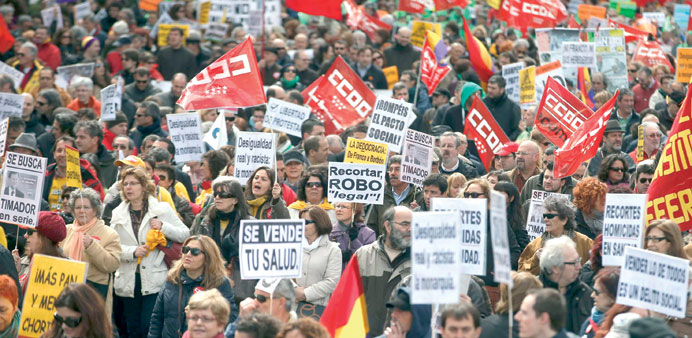People hold banners and placards as they march during a protest against government austerity measures in Madrid yesterday.
AFP/Madrid
Angry workers staged mass demonstrations in Spanish cities yesterday, protesting the country’s high unemployment rate and demanding political reform.
Thousands of demonstrators including health, transport and administrative workers marched in central Madrid and Barcelona, to the din of horns, drums and yells of “Government resign!”
Similar demos were called in 60 cities in a nationwide movement led by the two main trade unions, CCOO and UGT, and a wide collective of other civil groups.
They were the latest in months of strikes and protests against Prime Minister Mariano Rajoy’s austere economic reforms in a recession that has driven the unemployment rate over 26%.
Yesterday’s actions were called “against unemployment and for the renewal of democracy,” the UGT said in a statement.
Protesters raged against Rajoy’s spending cuts, which they say are hitting public services such as schools and hospitals and sharpening hardship in the recession.
“Bread and a roof at a fair price,” read some of the signs waved by protesters. Others brandished pictures of Rajoy with the words “Wanted: serial con man”.
Rajoy says the cuts are necessary to meet the targets for cutting Spain’s budget deficit that he has agreed with European authorities. He insists the painful measures will strengthen Spain’s finances and economy in the long run.
Protesters complained that through this austere economic drive the government and European Union leaders were imposing unfair suffering on citizens.
They also vented anger at the political establishment, aggravated by recent investigations into alleged corruption in the governing Popular Party and even the royal family.
“Our current problems can only be solved by political change,” said one demonstrator in Madrid, Pilar Gomez, a 52-year-old nursing assistant, wrapped in a red, yellow and purple Republican flag.
“The risk premium is going down and the stock market is going up. But the one thing that isn’t changing is the 6mn people unemployed,” she said. “We can’t allow them to condemn us to economic misery with the stroke of a pen.”
The UGT in its statement urged “a radical and urgent change in economic policy in Europe as well as Spain”.
“The policies of 2012 have been a resounding failure in tackling the crisis and have only made all our problems worse,” it said.
The Spanish unions held yesterday’s demonstrations ahead of a Europe Union-wide protest called by the European Trade Union Confederation on March 13 and 14.
Bulgarians demand stop to sale of state railway, protestor succumbs to fatal burns
Hundreds of Bulgarian anti-corruption demonstrators took to the streets for a fourth straight Sunday yesterday, demanding a halt to the planned selloff of the state railway’s cargo unit and an audit of all privatisation deals.
Street demonstrations brought down the centre-right government of Boiko Borisov last month and have continued since then, although numbers were smaller yesterday, indicating protests may be losing steam.
The Balkan country is headed towards early election on May 12 with Borisov’s party and Socialists neck-to-neck in opinion polls, making it likely that forming a government will be difficult and political uncertainty will continue.
Earlier in the day, a 53-year old father of five who set himself on fire last month in desperation from poverty in the central town of Radnevo died from his burns, becoming the third victim of self-immolation since the protests started.
With average monthly salaries of just 400 euros ($520) and pensions half of that, Bulgarians have the lowest living standards in the EU. They blame consecutive governments for doing too little to improve their lives and fight rampant crime and corruption.
Waving national flags and chanting “Mafia” and “Let’s get our the state back” about 600 protesters blocked all railway tracks at the central station in Sofia. About 1,000 people blocked rail tracks in the Black Sea city of Varna.
“The deal should be put off until there is a working government and parliament, so that the process be transparent and citizens can exercise controls,” said Ivailo Vasilev, an organisers of the protest in Varna.

